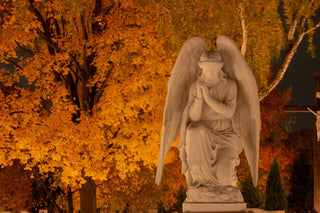On 2 November, Christians celebrate All Souls’ Day, dedicated to the Dead. This observance came up in the 9th Century, and it is celebrated just the day after All Saints’ Day.
Let’s discover together the meaning of this important Christian Feast.
The Origin of All Souls’ Day
While All Saints’ Day is Bank Holiday, All Souls’ Day is considered a normal working day, even though it is a solemnity for the Catholic calendar. In case it would fall on a Sunday, the Commemoration of All the Faithful Departed is usually moved to the next Monday.
During his life, the Benedictine Abbot Odilo of Cluny established this day to commemorate All the Faithful Departed. He was deeply devoted to the Souls in Purgatory and dedicated all of his prayers and penance to their freedom from this condition.
Legend says that, while coming back from the Holy Land, one of his confreres told Odilo about the encounter with a hermit, happened after a storm on the Sicilian coasts. The hermit told the confrere he heard the screams of the Souls in Purgatory while calling out loud the name of Odilo. Facing these words, the Abbot ordered all the monks of the Abbey to toll the death knells after the Vespers of 1 November, actually establishing the Christian Feast of All Souls’ Day.
The meaning of the Commemoration of All the Faithful Departed
Since ancient times, people were used to celebrate the dead with prayers and rituals. Even Christians are invited to pray for the Souls in Purgatory, the place where to expiate the sins of their life on Earth, in order to be welcomed in the Kingdom of Heaven.
Praying for the dead not only means entrusting them with Faith to the Lord’s mercy: through prayers, we meditate on the Mindfulness of Death and the promise of Eternal Life signed by Jesus Christ.
Holy Patrons of the Souls in Purgatory
Saint Nicholas
Many people associate Saint Nicholas of Myra to Santa Claus, but maybe not all of them know why Pope Leo XIII elected him the Holy Patron of the Souls in Purgatory.
Story goes that one night Saint Nicholas had a vision of a dead friar who asked him to offer Communion for him and for the souls that were with him, in order to save them all from Purgatory. The Saint accomplished his request and, for a whole week, he prayed for those souls. At the end of those seven days, the dead friar came back in his dreams and told him that, thanks to his action, he helped such many souls to go to Heaven.
Saint Michael
Everybody knows the Archangel Michael as a warrior who defended God against Satan. However, Saint Michael is so much more than this: he has such an important role as transporter of souls. In many iconographies he is usually represented with a scale instead of a sword; with it, he weights the sins of the souls.
Our Lady of Mount Carmel
Even this Saint, celebrated in the liturgical calendar on 16 July, is considered the Holy Patroness of the Souls in Purgatory. She has in her hands graces and power to alleviate the pains of her devotees. Also known as Our Lady of Suffrage, faithful direct their prayers to her in order to let the Souls in Purgatory reach Heaven, as soon as possible.
The Eternal Rest Prayer
The Eternal Rest, in latin requiem aeternam, is the prayer with which Christians ask God his intercession for the souls of their beloved ones. It is possible to recite the Eternal Rest even during other days, not only on 2 November. The Pope, in fact, recites this prayer every Sunday during his Angelus. Usually it is recited in the morning, in the evening, or at the end of the prayers of the Holy Rosary.
Eternal rest grant unto them, O Lord,
And let perpetual light shine upon them.
May they rest in peace.
Amen
Related Posts
All Saints' Day: the meaning according to Pope Francis→











